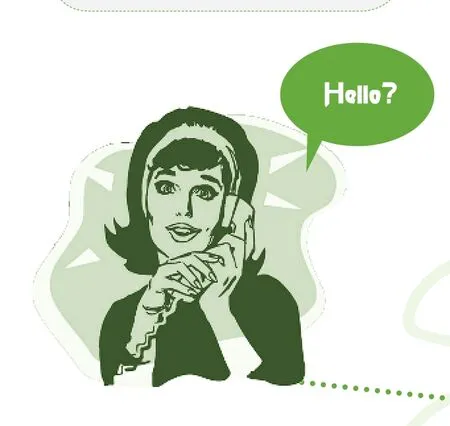How to Make Phone Conversations
2018-02-06如何打电话
如何打电话
⊙ By Robert Dick

听力难度

美式发音 适合精听
语速:140词/分钟
Jack: Citywide Copy Service, Repair Desk. This is Jack. How can I help you?
Angela:Hello, Jack. This is Angela Dodgeson at Wallberg Hotels. One of your repairmen, Paul,was here yesterday to repair our photocopier[复印机]. But it’s not working again this morning. I need him to come back as soon as he can.
Jack:Oh, yes. It was Paul who came out.
Angela:May I please speak to him?
Jack:I’m sorry, Ms. Dodgeson, he’s not in at the moment. Can I take a message for him, or will you call back?
Angela:Uhm, I’ll call him back in about half an hour.
Jack:OK, I’ll tell him.
Angela:Thanks.
(30 minutes later)
Jack:Citywide Copy Service, Repair Desk. This is Jack.How can I help you?
Angela:Hello, Jack. It’s Angela Dodgeson again. Can I speak to Paul, please?
Jack: Please hold. (Pause) Sorry, Ms. Dodgeson, he’s in a meeting just now.

Angela:Oh, no. Do you have any idea when the
Part 1: Copy Machine Breakdown
meeting will end?
Jack:I have no idea ’cause I don’t know what the meeting is about.
Angela:Well, I really need him to come back to our office as soon as possible to repair the copy machine again. It’s quite urgent. We have aconference[会议]tomorrow and we need to make a lot of copies today. Could you give him that message?
Jack:Sure. Could you spell your name for me?
Angela:Yes, it’s Angela, A-N-G-E-L-A;Dodgeson, D-O-D-G-E-S-O-N.
Jack: Got it. And your address again, please?
Angela:The Wallberg Hotel on Ellis Avenue at Donald Street.
Jack:OK, Ms. Dodgeson. I’ll ask Paul to get out there as soon as he can today.
Angela:Thanks a million, Jack.
Sorry, Ms. Dodgeson, he’s in a meeting just now.
Just now是由两个副词叠加构成的副词词组,多用在口语中,表示时间,但具体意思因应上下文而异。它可以指说话的时候,作“现在,眼下”解,也可指刚刚过去不久,作“刚才,才不久”解,亦指事情马上就要发生,作“现在就,马上”解。我们在理解时除了看上下文,还可以看句子的时态,如:
● I am busy just now.(此刻我正忙。
——说话的时候正在发生)
● Ted just now called.(泰德刚刚来电话
了。——说此话前不久发生)
● We are leaving just now.(我们就要走
了。——动作在说话后不久马上发生)
Part 2: The Lost & Found
DiNG!

John:Toronto Transit System Lost and Found. This is John.What can I do for you?
Daisy:Hello. My name’s Daisy Willamson. I think I may have forgotten a bag on the subway yesterday afternoon, and I’m wondering whether it might have been turned in.
John:We find things people forget every day. Could you give me some details about what you lost? What did your bag look like?
Daisy:It’s a light brown bag with a lot of dark brown Xs and Os all over it. It has two carry handles sewn on to the sides of the bag.
John:Anything else you can tell me about the bag, like what it’s made of, or its size?
Daisy:Well, it looks like leather and has a largezipper pocket[拉链袋]on the inside.
John:Can you tell me what was in the bag?
Daisy:Yes, a dark blue wallet with all my ID and some credit cards and receipts inside. It folds, it has a zipper pocket on one side and a magnetic closure clip[磁铁扣]. It has a bigscratch[刮痕]on the back. I think there was about $125 in there. I really hope you have my bag ’cause I especially need my wallet and phone.

John:Could you please repeat your name for me?
Daisy:Daisy Willamson. Have you got my bag?
John:Please spell your last name for me.
Daisy:W-I-L-L-A-M-S-O-N.
John:Address?
Daisy:Apartment 1604, 2180 Conway Avenue.
John:Well, Ms. Willamson, the good news is we have your bag. The bad news is you’ll need to go to the bank and also buy a new phone. Sorry, there was no money and no phone in the bag. Everything else seems to be there.
Daisy:Money can be replaced, but losing my phone is a big problem. What do I need to do to get my bag back?
John:You need to come to the TTS office at room 201, 1623 Spadina Avenue between…
Daisy:Oh, hold on a minute while I get a pen and paper.(Pause) OK, what was the address again?
John:1623 Spadina Avenue, room 201. We’re open between 8:00 am and 8:00 pm, Monday to Friday, and 9:00 am to 5:00 pm on Saturday. You’ll also need to bring some form of ID with you or tell us the time you made this phone call.
Daisy:OK. It’s 8:45 now, right?
John:Right.
Daisy:Thank you. I’m on my way to you right now.
I’m wondering whether it might have been turned in.
I’m wondering/I wonder
在口语中很常用,其实就是I want to know的意思,但比后者更客气、更婉转,特别是对不熟悉的人,或者晚辈对长辈,又或者下级对上级,用I’m wondering/I wonder显得没那么突兀,如: I wonder
if I might have a word with Mr. Thompson.(请问我能否和汤姆森先生说几句话?)

Part 3: Change of Plans
Adam:Hello?
Jenny:Is this Jerry?
Adam:No, he’s not here.
Jenny:Who am I speaking to, please?
Adam:It’s Adam. Is this Jenny?
Jenny:Yes. How come you’re answering Jerry’s phone, Adam?
Adam:You just missed him, and he forgot his phone.
Jenny:Oh. Do you know when he’ll be back?
Adam:I’m not really sure. Maybe in about an hour.
Jenny:I need to talk to him to change our plan for this evening.
Adam:Do you want me to take a message for him?
Jenny: Yeah, that’s a good idea.
Adam:Wait. Just let me find a pen. (Pause)OK, shoot.
Jenny:Well, we can’t go to Brazilian Barbeque because they had a fire there and,obviously, it’s closed, so, I thought we’d try the Aussie Steak House instead, so I made areservation[预订]for 7 o’clock, and I had a car accident and I can’t drive, so he needs to pick me up at Burke Auto Repair at 530 Fort Street about 6:30.
Adam:An Accident! Was it bad? Were you hurt?
Jenny: Not too bad. Some guy hit the right side of the car and damaged the rear wheel. I wasn’t hurt, thankfully.
Adam:Yeah!
Jenny:So, could you read back the message?
Adam: Not going to Brazilian Barbeque;burned down; going out to Aussie Steak House instead at seven; pick you up at Burke Auto Repair on Fort Street at 5:30.
Jenny:Almost right. He needs to pick me up at 6:30, not 5:30, and the repair shop address is 530 Fort Street. Got it?
Adam:Oh, pick you up at 6:30 at 530 Fort Street, right?
Jenny:Yes. And ask him to phone me on my cell, 555-6318, as soon as he gets in, OK?
Adam:Phone Jenny ASAP at 555-6138.
Jenny:No. It’s 555-6-3-1-8.
Adam: Got it. OK. I’ll give him the message as soon as he gets home.
Jenny: Thanks, Adam.
Gotta go. Bye.
Adam:Bye.

Is this Jerry?
口语学习
● Shoot.
我们知道,shoot作动词时,可作“射击,(篮球)投篮,拍摄”等解。在口语中,它通常以祈使句的形式出现,用于让对方开始说话,相当于“开始吧,说吧”,但此用法较随意,不适合在正式场合使用,如:
—Can I ask questions about last night? (我可以就昨晚问几个问题吗?)
—Sure. Shoot.(当然,说吧。)
● Got it.
这是非常常用的口语表达。在对方解释某事,或者提供某方面的信息后,说话者用它表明自己已经明白对方的意思,相当于“知道了,我懂了”;它也可以在解释某事,或者提供某方面的信息后,用问句的形式来询问对方是否理解,如:
—Go straight for about 100 meters and turn right at the traffic lights. You will see the library. (直走一百米左右,到了红绿灯转右,你就会看到图书馆了。)
—Got it. Thanks.(明白了,谢谢。)
打电话常用语
● 通话双方:This is…/It’s…/Who am I speaking to?/Is this…?
● 找人:May I please speak to…?/Can I speak to…?/…is not in at the moment./Do you know when…will be back?/Will you call back?/You just missed him.
● 留言:Can I take a message?/Could you give…that message? Do you want me to take a message for…?/Could you read back the message?/Could you repeat that?
● 请对方稍等:Wait./Wait a minute./Please hold./ Hold on a minute while…
